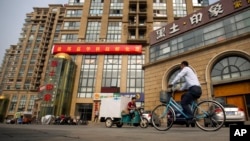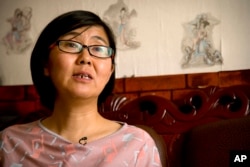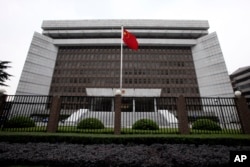After a year-long detention, Zhao Wei, a 24-year-old assistant to a prominent lawyer, was released Thursday after she had confessed her crimes and had shown a good attitude, according to police and her lawyer.
“I was too simple-minded. I didn’t know what I have done is a betrayal to my own vision and has caused harm to my country that I love dearly,” Zhao was quoted as saying on state media.
On her own Weibo account, Zhao’s own post read “The afternoon sun is so nice. And it feels really great to be able to breathe freely. A year is both long and short. And I have had plenty of reflections and experiences.”
Zhao, one of the youngest defenders to be taken into custody last July, had worked for rights lawyer Li Heping, one of 16 detainees on charge of subversion of state power, after her boss had defended members of the banned Falun Gong group and dissident writers.
As her release on bail is unusual in China’s legal system, the authorities may have sought to lower public attention to the anniversary of her detention by releasing her, her lawyer Ren Quanniu was quoted as saying by the AP news agency.
Her release marks the first anniversary of the lawyer crackdown with a glimmer of hope.
Change unlikely
But observers say China has shown little sign of easing its clampdown on rights defenders one year after the government arrested and interrogated nearly 320 human rights lawyers and activists during what was described as the worst crackdown in two decades.
“The July 9th crackdown is still very much present and ongoing nationwide. It has become the big stick for authorities to carry when dealing with sensitive issues,” said Wen Donghia, lawyer to Wang Yu – the first rights defender arrested amid an orchestrated campaign last July.
Wen added pessimistically that one doesn’t need to look far to find the big stick tactic has been repeatedly used among rights advocates, including the recent arrest of Lin Zulian, chief of Wukan village in Guangdong province, ahead of planned protests.
Wang, currently detained in the northern port city of Tianjin on suspicion of “subversion of state power,” gained fame as China’s first female rights lawyer for having defended Uighur economist Ilham Tothi, who is now serving a life sentence on separatism charges, and a high-profile rights activist who died in police custody.
She was awarded the prestigious Ludovic Trarieux Prize last month for her work of defending the rights of her clients.
Basic rights deprived
But, as of now, she and 22 other legal advocates remained in detention on charge of criminal offenses. And the majority of them are still held incommunicado and deprived of fundamental rights to legal counsel of their own choosing while another 39 people having been barred from leaving the country, statistics of the Hong Kong based China Human Rights Lawyers Concern Group showed.
Rights groups have long denounced Beijing’s move to treat rights defenders with mass arrests, forced confessions and illegal detentions while waging a war against them as enemies instead of partners in pursuing the rule of law.
But what concerns them even more now is the government’s stepped-up efforts to silence their equally innocent family members or peer lawyers, who vow to get to the bottom of their cases.
“To prevent their family members and lawyers from fighting back, they [authorities] have tried all means to suppress and criminalize [us],” lawyer Wen said, “For example, with threats from judiciary agencies or secret police as well as pressure from your own law firms, they will do whatever it takes to elbow you out.”
He added that with China’s police state reaching a new level of oppression, the country’s human rights condition has deteriorated.
The report from the Hong Kong-based group said the mass crackdown has sent a chilling effect to the community of rights lawyers as some have reduced their presence at protests or their contact with other rights lawyers to avoid further implication.
Suppression against civil society
Another rights group, Chinese Human Rights Defenders (CHRD), argued that the crackdown has epitomized President Xi Jinping’s rule since 2013 with police ignoring or perverting domestic laws and the Constitution.
In a news statement, CHRD urged Chinese authorities to “immediately and unconditionally release all individuals detained in the crackdown, end political interference in the independence of lawyers and protect fundamental rights as guaranteed by the Universal Declaration on Human Rights.”
Wang Yanfang, the wife of rights lawyer Tang Jingling, couldn’t agree more, saying the wrongs must be righted.
“I, too, hope that China can truly honor its Constitution and law enforcement officers abide by our country’s laws. Failing to respect the law, each and every one of us can be the next victim of persecution,” Wang told the VOA, insisting that her husband was implicated for exercising his legitimate rights as a lawyer to defend rights of his clients.
After a two-year detention, Tang was given a jail term of five years in May for promoting “non-violent civil disobedience” and demanding the peaceful transformation to democratic rule in China.
Although her husband was arrested prior to last year’s crackdown, Wang was among several wives of detained lawyers who staged a small-scale protest in Beijing last Monday to accuse police in Tianjin, where their loved ones are held, of denying lawful access to their husbands.
Sharing their pains and desperation, Wang said she was aware their protests are unlikely to change anything, adding that she herself has been given little access to Tang.
But it is their hope and conviction that justice will eventually prevail if the society’s fight against the abuse of power continues.






